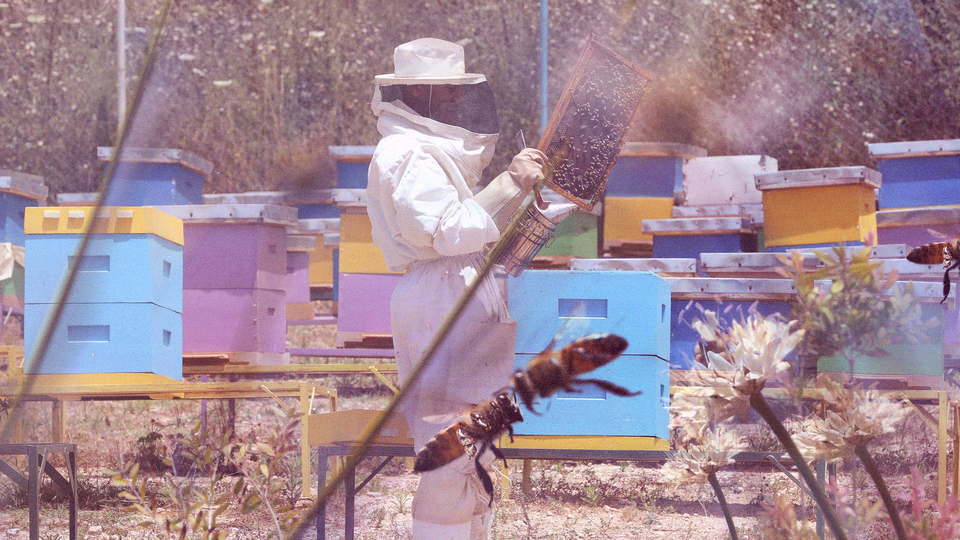Collective Beekeeping in South Lebanon
On a little hill north of Sur, in the village of Mazra’at Jemjim, tens of thousands of bees and a few beekeepers buzz away at work amid citrus trees, aromatic flowers, and brightly colored hives.
It is the end of spring and Khaled al-Mahmoud is preparing the hives for the summer at the By Bee farm. He adds frames and layers of wax, making sure to separate those reserved for the bees’ own nutrition from those he extracts for honey.
Khaled al-Mahmoud started beekeeping 10 years ago to help out his father, but over time, the profession grew on him.
“There’s a pleasure in this work that you cannot imagine until you get in a [beekeeping] suit and do it. It’s a different world,” he says, his eyes lighting up.
Since joining By Bee, a beekeeping collective created a little over a year ago, al-Mahmoud has had access to training in new techniques, equipment he could otherwise not afford, recycled wax that he previously had to buy new every season, and a space to house his hives without worrying about robberies, pesticides, or forest fires.
More importantly, he has found a community where his opinion is valued.
“They take my input seriously and integrate it into the work plan and add their own suggestions,” he tells The Public Source.
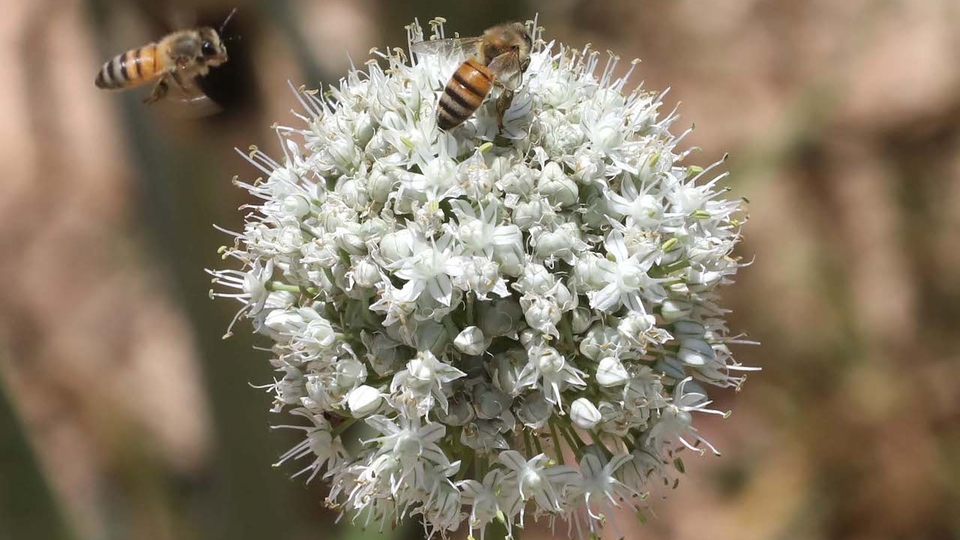
Two bees pollinate an onion flower in the By Bee farm. Mazra'at Jemjim, Lebanon. June 11, 2022. (Marwan Tahtah/The Public Source)
Beekeeping as Mutual Aid and Cooperative Work
Started as a grassroots initiative, By Bee brings together Lebanese, Palestinian, and Syrian professional and amateur beekeepers working in South Lebanon. In addition to a core team of five, By Bee hosts beekeepers from neighboring villages and has invited over 300 beekeepers to train and use its equipment.
The farm consists of a small field hosting around 80 beehives, a garden with a hammock, and a few rooms: a wooden cabin for meetings where beekeepers can share their expertise, an equipment room with machines for extracting and bottling honey, and an exhibition room for the products made on the farm.
“We are a group of young people who love bees and who want to help advance the industry,” says By Bee founder Mohamed Moneim.
Started as a grassroots initiative, By Bee brings together Lebanese, Palestinian, and Syrian professional and amateur beekeepers working in South Lebanon.
Moneim’s interest in beekeeping started as a hobby six years ago, but quickly grew into a new career and a passion.
“I asked myself, do I just want to produce and sell honey? I wanted to also integrate a social aspect into it,” he tells The Public Source. He considers beekeeping a profession requiring a low initial investment with a big potential for growth, an appealing opportunity amid the economic crisis.
In 2020, he began holding training sessions for youth in the villages surrounding Sur.
Mona al-Sayed, 22, says she used to tease Mohamed Moneim about his work, “I thought bees did all the work.” Out of curiosity, she joined one of his training sessions and soon came to understand the appeal of the craft.
She remembers that even then, Moneim dreamt of something bigger: a community space for beekeeping.
“He had already drawn the showroom with wood design that looks like a hive to store the honey jars [on a piece of paper],” the young woman muses.
Around the same time, Moné Makkawi moved to Lebanon from the United States to work on her Ph.D. on non-Lebanese labor in agricultural spaces in South Lebanon. Through a common friend, she met the collective's founder, started beekeeping, and joined its core team by helping with fundraising and proposal writing.
At By Bee, Makkawi says she found an intersection between the minutiae of beekeeping and bigger political questions that she was exploring in her research — questions of mutual aid, austerity measures, and social justice.
“How can we work together towards a common goal when the resources are next to none? The initiative really addressed these things in a simple but effective way.”
“How can we work together towards a common goal when the resources are next to none? The initiative really addressed these things in a simple but effective way.” —Moné Makkawi, By Bee member
Mohamad Khaled is one of the beekeepers who directly benefit from the initiative. Before By Bee, he couldn’t afford a honey extractor machine and had to resort to asking for favors from other beekeepers every season.
“It’s really comforting to find a place to extract honey because it was really a problem,” he admits.
The young beekeepers of By Bee have also been able to buy material in bulk at lower prices than they would have been able to get individually. By Bee also received a one-time grant to purchase machines for collective use, including one that allows them to melt old wax, reshape it, and reuse it.
With these machines, By Bee is providing an option that is sustainable on both economic and environmental levels, “an option which most people can’t afford [...] or don’t have the opportunity to even think about,” Moné Makkawi tells The Public Source.
Since many members of the team have been beekeepers for years, they use their personal experiences and challenges to suggest projects that might benefit others.
“By Bee was created to solve problems we faced; the same way we did that for ourselves, we want to offer it to others,” Moneim says. So far, more than a dozen beekeepers have benefitted from their services in one harvest season, he says.
Despite their passion for beekeeping, most core members still hold day jobs, which partly fund the collective's activities until it can become self-sufficient.
Mohamad Khaled is a marketing student. Despite the odd hours and laborious tasks, he works on the farm because he is fascinated by the natural world and its details. He enthusiastically explains how bees cool themselves in hot weather by flapping their wings.
Mona al-Sayed is a communication manager and has volunteered to run By Bee’s social media. Even though she isn’t a professional beekeeper herself, she joins the beekeepers on the ground, driven by her love for nature.
“The land loves my presence and I love the land’s presence in my life,” she exclaims. At the farm, she feels free from the worries of her day job and takes pleasure in the work.
Al-Sayed explains that, in order to accommodate everyone’s busy schedules, the team divides tasks among themselves. Each person is responsible for their own work and can make the necessary decisions independently while big organizational decisions are made collectively.
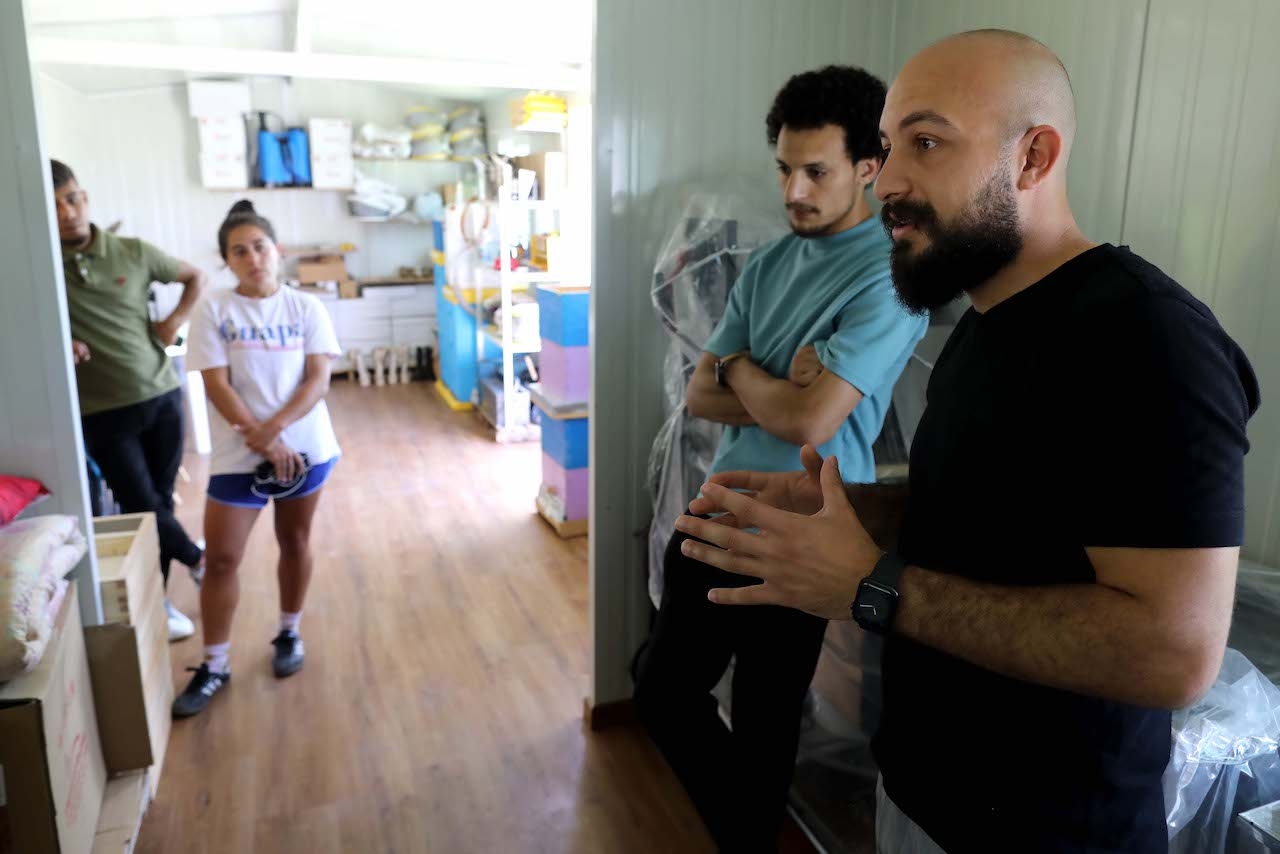
Mohamad Moneim explains the process of extracting honey in the equipment room, with the rest of the team standing by. From right to left: Mohamad Moneim, Mohamad Khaled, Moné Makkawi, and Khaled al-Mahmoud. Mazra'at Jemjim, Lebanon. June 11, 2022. (Marwan Tahtah/The Public Source)
The State of Beekeeping in Lebanon
While Lebanon’s centuries-old beekeeping industry has declined in some areas like Mount Lebanon, it has recently sprung and flourished in the South, according to Raed Zeidan, beekeeper and author of the country’s curriculum for beekeeping at agricultural schools.
There are around 6,000 beekeepers in the country, with 350,000 hives that are moved to different altitudes depending on the seasonal conditions, according to Afif Bou Chedid, beekeeper and owner of Golden Queen Bee Center. However, the industry lacks governmental support, he says.
The beekeeping industry has not been spared by the consequences of the collapse of the country’s neoliberal economy and the devaluation of Lebanon’s currency.
Several beekeepers across Lebanon told The Public Source that the Ministry of Agriculture often falls short of its duties and that regional syndicates are merely supportive — if operational at all. Even with laws in place that offer needed protection against deforestation, implementation is lacking and often eluded through “wasta,” Raed Zeidan says.
The beekeeping industry has not been spared by the consequences of the collapse of the country’s neoliberal economy and the devaluation of Lebanon’s currency. Fewer customers are able to afford local honey, while the cost of beekeeping material constantly increases and is priced in dollars.
According to Afif Abou Chedid, beekeepers have to sell their products in Lebanese liras for less than half of what they used to. In parallel, he notes a 30 percent increase in the cost of materials like wax, treatment for hives, and machinery.
The economic crisis has stripped many in Lebanon of the ability to plan beyond their immediate needs. For the By Bee team, this pressure has imposed the necessity of finding an alternative, and the grassroots initiative is their vision for the way forward. The farm offers them another way of thinking and working together towards community-based and local goals.
“It’s a practice in creating something that we would want Lebanon and our communities to look like in the future, and it’s evident how it’s a labor of love.”—Moné Makkawi, member of By Bee
“Everyone contributes what they can and it’s a space open to all,” Moné Makkawi says.
“It’s a practice in creating something that we would want Lebanon and our communities to look like in the future, and it’s evident how it’s a labor of love.”
Healthy Bees, Healthy Environment
Globally, neoliberal policies that have prioritized economic growth over environmental prosperity have harmed wild bees as well as apiculture. Beekeepers and scientists are witnessing disruptions in the natural world due to the climate crisis and harmful environmental practices such as deforestation and pesticides.
“Nature around us is changing. Honey is the biggest indicator,” Mohamed Moneim affirms. “There is as much honey as there are flowers. In the best case scenario, the production of honey today isn’t even half of what it was 20 years ago.”
“The big problem with climate change is that these changes are happening so quickly that animals can’t keep up.” —Pauline Aad, animal scientist
Agricultural engineer and animal scientist Pauline Aad told The Public Source that scientists are expecting a change in the micro-environment in Lebanon: a variation in the time of year when plants bloom could cause a loss of synchronicity between flowers and bees’ pollination habits.
“The big problem with climate change is that these changes are happening so quickly that animals can’t keep up,” she explains.
The By Bee team has already noticed disruptions on the ground. Moneim says that this year’s long and cold winter may have caused a shift in the bees’ behavior.
“Bees started attacking humans because they were so hungry. When flowers started to bloom, the bees started to get calmer,” he notes.
He points to a premature white flower on the fence surrounding the farm: the cephalaria leucantha (زهرة الفقوع also known as زهرة نبات الرباط) that bloomed a month early. Beekeeper Khaled says that it caught both them and the bees by surprise.
While this small change might not necessarily affect the bees’ health, it could affect the schedule and quantity of honey produced.
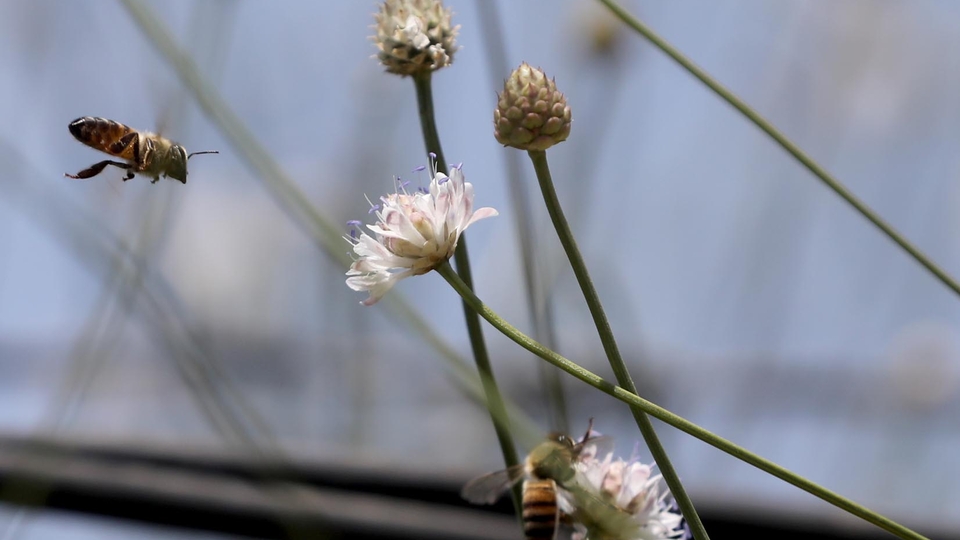
A bee heads towards a cephalaria leucantha. This flower bloomed unusually early on the fence around the farm. Mazra'at Jemjim, Lebanon. June 11, 2022. (Marwan Tahtah/The Public Source)
Beyond timing, plants grown from genetically modified seeds disrupt bee movement patterns and communication in the hives, Raed Zeidan says.
“Bees need natural flowers, not flowers that are polluted by chemicals,” he tells The Public Source.
Another environmental challenge for beekeepers is the deadly effect of some pesticides used by neighboring farmers on their fruit trees. Zeidan explains that if farmers spray the trees when or right before flowers bloom, which is when the bees visit them to collect pollen, the small insects will transport poisonous chemicals back to their hives. This could kill them almost immediately, poison the larvae, or even seep into the honey.
Mohamed Moneim and Afif Abou Chedid told The Public Source that it is impossible to stop farmers from using pesticides, especially with the inaction of the Ministry of Agriculture. Their best bet is to coordinate their schedules to avoid exposing the bees to pesticides.
“Our biggest achievement is this coordination,” Moneim boasts. “Farmers let us know one or two weeks in advance when they need to spray their pesticides so that we can have enough time to figure out where to take our bees.” They usually temporarily move the hives away from the fields being sprayed.
Makkawi, the Ph.D. candidate, adds that the conversation with farmers was essential in raising awareness about the importance of bees.
“[If] this conversation exists and communication [is] to grow, everyone can benefit,” she says.
Bees are essential to more than honey production. They transport pollen from male plants to female plants, allowing for fruit to form.
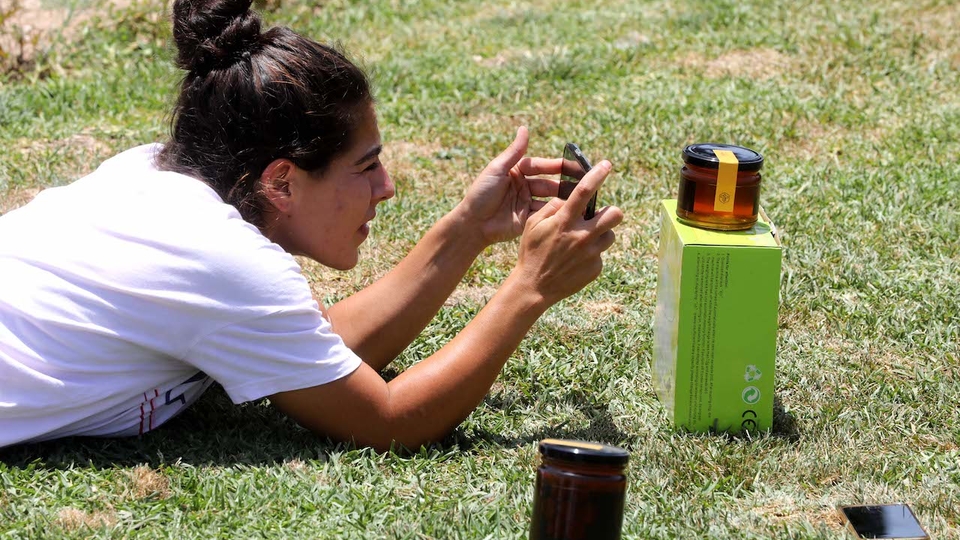
Moné Makkawi lies on the grass to photograph a jar of honey produced by the By Bee farm for their upcoming online shop. Mazra'at Jemjim, Lebanon. June 11, 2022. (Marwan Tahtah/The Public Source)
“Bees play an essential role in pollinating flowers, increasing the quantity and the quality of the produce,” says Raed Zeidan. “If it has indentations, it takes its natural shape, its natural shiny and beautiful color, the taste, the texture... everything is affected by pollination by bees.”
Khaled al-Mahmoud adds that bees are very important to agricultural production, especially citrus and palm trees, staples of the southern scene.
“All the citrus fruits like lemon and oranges that you see in markets wouldn’t exist if bees didn’t pollinate the flowers,” he says.
The endangerment of bees not only affects human nutrition, but also impacts other animals and threatens biodiversity.
In the Chouf Cedar reservation, the introduction of bees was crucial in the preservation of rare plants, Raed Zeidan attests, noting that these plants have since increased in number.
“Bees and the environment are interdependent. If one is harmed, the other will be harmed. If the environment is doing badly, bees will do badly, if the environment is doing well, bees will be well.”
